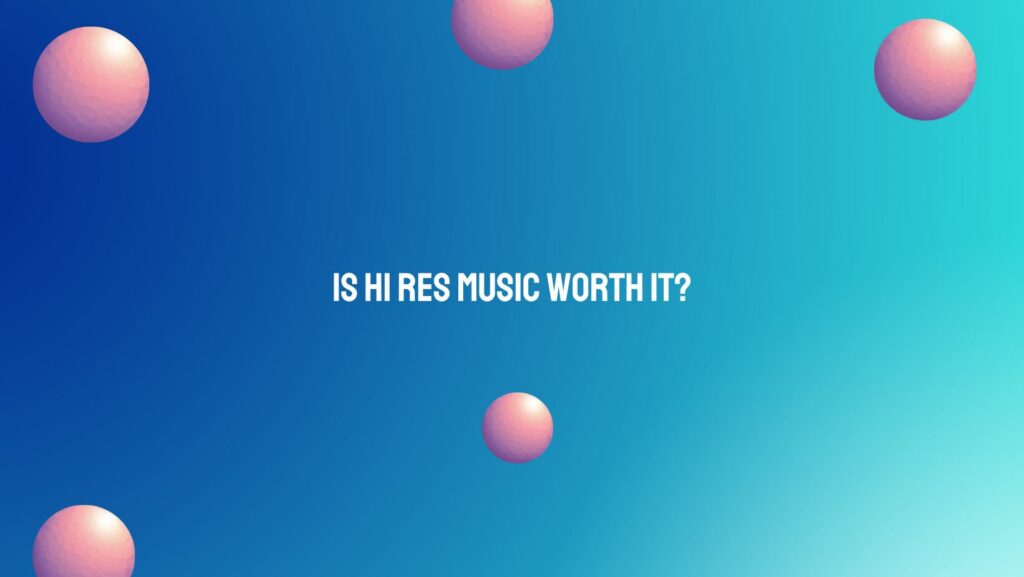In the ever-evolving landscape of digital audio, the discussion surrounding the value of high-resolution music, often labeled as “Hi-Res,” is both intriguing and polarizing. Audiophiles and music enthusiasts find themselves at a crossroads, debating whether the pursuit of higher fidelity audio is truly worth the investment. In this article, we will delve into the considerations that surround Hi-Res music, exploring the potential benefits, drawbacks, and the overall value it brings to the listening experience.
- Defining High-Resolution Music:
High-resolution music typically refers to audio files with a higher sampling rate and bit depth than standard audio formats like CD-quality (16-bit/44.1kHz). Hi-Res formats can include 24-bit depth and sampling rates of 48kHz, 96kHz, 192kHz, or even higher. Proponents argue that this increased resolution captures more details, resulting in a more faithful reproduction of the original recording.
- Perceived Audio Quality:
The primary allure of Hi-Res music lies in the promise of superior audio quality. Advocates contend that the increased bit depth and sampling rates can reveal finer nuances in the music, providing a more immersive and detailed listening experience. For those with high-end audio equipment, the benefits may be more discernible, offering a sonic journey closer to the artist’s intent.
- Equipment and System Considerations:
To fully appreciate the benefits of Hi-Res music, having the appropriate playback equipment is crucial. High-quality headphones, speakers, and digital-to-analog converters (DACs) become integral components in the chain. Enthusiasts investing in a dedicated audio setup are more likely to discern the subtleties that Hi-Res formats bring, whereas casual listeners may not experience a significant difference.
- File Size and Storage:
A notable drawback of Hi-Res music is the substantial increase in file size compared to standard audio formats. Hi-Res files demand more storage space and may present challenges for those with limited storage capacity on portable devices. Balancing the desire for audio quality with practical considerations is a key aspect of evaluating the worthiness of Hi-Res music for individual users.
- Availability and Catalog:
The availability of Hi-Res music is continually expanding, but the catalog may still be limited compared to standard-resolution formats. Certain genres and artists may have a more extensive Hi-Res library, while others may be less represented. For users with specific musical tastes, the availability of Hi-Res content becomes a crucial factor in assessing its value.
- Personal Listening Preferences:
The value of Hi-Res music ultimately boils down to personal listening preferences. Some individuals may be more attuned to audio subtleties and find the enhanced resolution gratifying, while others may not perceive a significant difference or prioritize the convenience of streaming services over absolute audio fidelity.
- The Role of Mastering and Production:
The recording and mastering quality of the original source material play a vital role in the perceived benefits of Hi-Res formats. Well-produced recordings with meticulous mastering can showcase the advantages of higher resolution, while poorly recorded tracks may not demonstrate a substantial improvement.
Conclusion:
The question of whether Hi-Res music is worth it is inherently subjective, hinging on individual preferences, equipment quality, and practical considerations. For enthusiasts with a passion for audio excellence and the means to invest in high-end gear, the pursuit of Hi-Res music can be a rewarding endeavor. However, for others, the incremental gains in audio quality may not justify the added costs and logistical challenges. As the audio industry continues to evolve, the debate surrounding Hi-Res music will persist, prompting users to navigate the intricate balance between the pursuit of sonic perfection and the practicalities of everyday listening.


